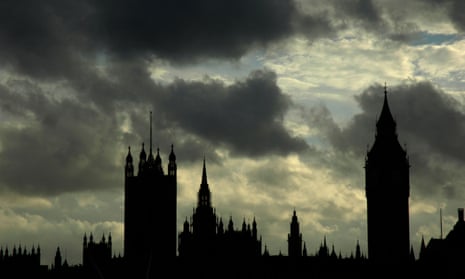Winter is coming. The Bank of England says so. Pick your measure of the economic gale that is heading this way, deepening a chill that’s already biting hard. The Bank says inflation will reach 13%, shrinking the value of wages, making everything more expensive, starting with eating and heating, forcing yet more people to decide whether to starve or shiver. We are to brace for a recession that will see five consecutive quarters of contraction, and a decline in household incomes of 5% by 2024 – the biggest fall since records began more than half a century ago. Of course, all this will hit hardest those with least. One in five UK households will be left with no savings at all by 2024. Meanwhile, inflation is as much as 30% higher in the towns and cities of northern England, thanks, says the Centre for Cities, to poor home insulation and a “car dependency” that forces people to shell out more on petrol.
You don’t have to be a strict economic materialist of the old school to know all this will shape our politics, in ways both deep and shallow. Start with the latter and the current contest to pick Britain’s next prime minister, a process of anointment mysteriously delegated to a select priesthood of 100,000 or so Britons who are anything but representative of the country whose fate they hold in their hands.
By rights, the Conservative party leadership race should be convulsed by the warning from Threadneedle Street, though of course the two contenders hardly needed Thursday’s forecast to know the UK is already in a grave cost of living crisis. Liz Truss and Rishi Sunak should be preparing themselves and their party for the extremely tough task one of them will face in less than a month. But that’s not how it is.
Instead, Truss continues to serve up soothing fantasy talk of tax cuts, even as she splashes the cash, with spending promises on everything from defence to doctors’ pensions: cakeism’s most famous exponent may be in his final days as PM, but his doctrine lives on in Truss. Sunak likes to pose as Mr Sensible, insisting that immediate tax cuts would merely “put fuel on the fire” of inflation, but he is engaged in his own form of pander politics, telling the Tory selectorate whatever rubbish they long to hear.
Unluckily for him, we now have video evidence of quite how low he is prepared to sink in that endeavour – and how rightwing he actually is. In a rather lovely garden in Tunbridge Wells, he boasted to local Tories of his efforts as chancellor to reverse Treasury formulas “that shoved all the funding into deprived urban areas” rather than to more deserving communities like theirs. That’s right: it’s Tunbridge Wells that needs the help.
Nationally, surely, it will be a different story. You’d think no governing party presiding over an economic cataclysm of this order could hope to be re-elected. Runaway inflation, imminent recession, mortgages up, incomes down: every political handbook says those are the circumstances in which incumbents get walloped by the voters. Keir Starmer should be miles ahead of the Conservative alternative, whoever it is. And yet look at the Thursday poll that showed that, in a match-up of Starmer v Truss, it is Truss who is ahead by two points. Labour is in front in other surveys, of course, but given this climate it should be out of sight.
Still, with an economic shock of this order the impact will be felt far beyond Westminster and electoral politics. Deep in the western folk memory is the knowledge of where hyper-inflation can lead – Berlin wheelbarrows full of worthless banknotes as the precursor to Hitler – but what about a steep rise in inflation that is not on that Weimar level, but is a hike all the same? What will that do to our politics?
A rapid consequence could be a change in the public attitude towards the war in Ukraine. The most obvious cause of the current inflation surge is the rise in oil and gas prices triggered in part by Russia’s invasion. Standing with Kyiv, and sanctioning Moscow, has come at a cost paid by regular people on the forecourt and in their heating bills. Up to now, Britons, along with most Europeans and Americans, have been admirably solid in their support for the victims of Putin’s aggression. But as inflation bites harder, that could shift, with new pressure on Kyiv to give way to its tormentor, if that’s what it takes to get prices back down.
Public discontent may find another outlet. The first signs of the kind of disobedience movement that greeted the poll tax in 1990 are emerging, with a Don’t Pay campaign urging consumers to refuse to settle their energy bills until the companies lower their prices. Energy retailers will stress that they are not the same as energy extractors such as BP, which this week announced it had tripled its quarterly profits to £7bn, but few will be in the mood to make that distinction.
An inflation rise of this order travels across class lines. Working people struggle, because a galloping inflation rate turns even a wage increase into a cut. The middle classes, meanwhile, see any savings shrink before their eyes. If they are homeowners, their mortgage bills will soar, potentially out of reach. And when houses start getting repossessed, fear turns to fury.
Where does that anger go? Guardian readers might hope it is directed at the act of self-harm that’s made our current woes so much worse. I asked Albrecht Ritschl, professor of economic history at the LSE, what single move the UK government could make to alleviate the pain. “Suspend Brexit for 20 years,” came the reply. He knows that’s not going to happen. But he explains that today’s crisis is not one of demand, but of supply: there’s just not enough stuff to meet demand, thanks in part to the post-Covid blockages in the global supply chain. In Britain, that’s exacerbated because we can no longer import European goods as freely or as cheaply as before.
In that context, policymakers are left with a question of distribution: how to share out the finite, indeed shrinking, amount we have. The priority surely has to be those who simply cannot afford to live: restoring the £20 uplift to universal credit would be a start. But, says Ritschl, “if you want to give something to the poor, then you have to do it like Robin Hood – and take from the rich”. In other words, not the tax cuts Truss is promising, but tax increases on the wealthiest.
A wealth tax, a benefits rise and a rethink on Brexit: there would be some comfort in imagining those as the consequences of this crisis. But I wouldn’t hold your breath. Instead, memories stir of the last such inflation hike, in the 1970s. That decade brought a surge in political violence and a rise in support for the racist far right, in the form of the National Front.
Under Boris Johnson, the Conservative party has shifted towards a nationalist populism that Truss seems unlikely to jettison. That creed is already of an ugly hue, but it could darken – especially when winter comes.
Jonathan Freedland is a Guardian columnist

